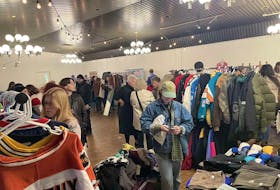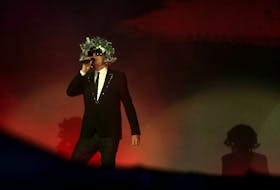Charlottetown — Talking with Benjamin Windsor Powell’s family, you realize there’s no way to distil his life into one newspaper article.
The man who founded Charlottetown turned 90 Monday, so we spoke with members of his family to get a feel of what Uncle Ben, as he is affectionately know, is all about.
You would think there would only be so many tales to tell, that there would be some repetition in their stories about dad or granddad — but that’s simply not the case.
Each member speaks of him differently: there’s the campfire-like, adventurous tales told by his middle son Tony Powell — spoken quickly and punctuated often with “you see?” — there is the pride bursting from his granddaughter Lisa Dempster as she recites his poems; the quiet-spoken memories of his eldest daughter Marie Powell, who gives furtive catches of laughter as though she may have said too much; and finally the slow, considered stories told by the youngest son Irving, who guffaws at each punch line.
It’s almost as if each one of them, in their own unique way, wants to pay tribute to the man who shaped their lives — and the history of coastal Labrador.
On the line
Born in Carbonear in 1921 to a mother from Labrador and a father from Newfoundland, Uncle Ben began his love affair with Labrador when he was 15 years old.
His father ran sailing ships, which meant he was away from his family for incredibly long stretches of time — two years being the longest. At a time when thousands of Newfoundlanders were on welfare, things were tough.
Lisa tells me he was standing on the beach by his hometown one day in 1936 when he looked out to sea and thought “somewhere there must be a better life.”
He decided to try his luck in Labrador and took a ship, the General Hag, to Square Islands where his brother Roland was fishing.
They started trapping together and no matter who you speak with today, it’s clear trapping was his first love.
Uncle Ben spent years trapping in the Labrador wilderness and as the kids remember, he was happy to share his craft.
“I wasn’t too old the first time I went out with him — maybe eight or nine,” Irving recalls.
“It was a Saturday morning and when we got to the first trap there was a big mountain cat, and when we got to the second one there was another mountain cat. By the time we got to one of the last traps, there was another one, another mountain cat, huge.
“He figured I brought him good luck so from then on he’d often take me along with him.”
Uncle Ben’s brother Lester, a pilot for 42 years, remembered that in the 1980s and 1990s when he was flying away from home most of the time, he always made sure he got home once each winter to take a trip over the trapline.
“He was always happy to fry a steak at the cabin,” he says, “a big step up from his earlier years of porcupine and partridge.”
Before all that though, Uncle Ben trapped with his brother in the mountains, catching everything from lynx and beaver to otter and squirrels — as Tony puts it, “every kind of fur-bearing animal.”
“He told me lots of stories from them days, but there was one in particular where he and his brother were out in Hawke River Mountains looking for caribou, and they got a real bad snow storm blow in,” he recalls.
“Five foot of snow fell and it was that kind of snow they’d just sink right down into, even with their snowshoes. They took 15 days to make it back out. They were running real low on food and it was tough, but they made it out.”
That didn’t discourage young Ben from trapping; he stuck at it with his brother until he was about 19, then headed off on his own.
Wedding belle
Not long after that he married the other love of his life — Effie Campbell.
Uncle Ben met Effie when he first moved to Labrador and Lisa, who was raised by her grandparents, says her pop loves to recite the poem he wrote about the day they met.
“He can still recite it today, verse for verse,” she says, laughing. “You just have to ask him about the day he met a pretty girl and he’s off.
“His memory is all but faded, but he can still to this day recite this poem from memory word for word. Maybe love does transcend all.”
Throughout their marriage, Uncle Ben and Effie had nine children — Lewis, Lester, Sandy, Marie, Tony, Ramsey, Blanche, Ben Jr. and Irving.
If nine kids weren’t enough, as Marie remembers it, there were always other people stopping by and sleeping on the floor if they had nowhere else to go — and Uncle Ben and Effie always made room.
From visiting clergy to nurses and doctors, they all stayed at the Powell household.
“There were always loads of people here, always a crowd,” she says.
“He misses that now, always asking ‘where’s our crowd?’”
Although the speed bumps of old age have slowed him down, during the course of his life Uncle Ben was everything from a trapper to a sawmill operator and merchant. He also started a fish plant in Square Islands, not far from Charlottetown, and the first snowmobile dealership in the area.
In short, he never stopped.
“When he married, he already seemed like he was a step ahead of everyone even though he was so young,” Tony says.
It was that entrepreneurial spirit and dedication to hard work that led to the beginnings of Charlottetown.
Town founder
Back in the late ‘40s and early ’50s, families were spread out along the Labrador coast which meant there were few, if any, services — and no school or healthcare.
“Everyone had their own trap line which is why everyone lived spread out,” Lisa says, “They trapped the area where they lived.”
“One winter night in 1950, pop met up with a fellow trapper, his brother-in-law Clarence Perry.
“That night, as they stayed together in a little log cabin, they both talked about their dreams of having a school so their children could receive an education. So they decided to see if they could bring everyone from the outlying areas together, start a little community and maybe get a school and other services like health care.”
And so in the fall of 1950, they headed to a place formerly known as Old Cove and did just that.
At first it was just the mill, but Uncle Ben wanted it to be more — he wanted Charlottetown to be a real community.
In 1951 the Powells were the only family there, but by 1952 others had moved in.
“With only a Grade 3 education for himself he wanted better for his own children for their education, that’s why it was so important for him to start that school,” Tony says.
“Nowadays kids from that school are everything — they’ve gone to university, they’re engineers and lawyers. You name it, they’ve come out of that school and are successful, and that’s what he wanted.”
He also built what Tony says was the first longliner in Labrador — a 45-footer called Miss Charlottetown.
Throughout all this, he was also an established merchant. That term invokes images of greed and mean-spiritedness in some parts of Newfoundland and Labrador, but Tony says that’s not what his father was about.
“If anything he was the other way,” he says, chuckling.
“He helped everyone. Anyone who came to him in need, he always did his best to them.”
Uncle Ben’s giving nature is echoed by Marie.
“He was always quiet man of very few words, but he’s always wanted to help,” she says.
“He loved to help people and he was always appreciative — even now he always wants to help, always trying to help do the dishes and that kind of thing.”
Branching out
Uncle Ben’s dedication to, and investment in, coastal Labrador also led to the establishment one of the most important dog team trails in the region — the one that ran from Port Hope Simpson to Charlottetown.
“The only time we’d really see him at home during the day was at mealtimes to eat, or on a Sunday. He’d work hard but Sunday was his day of rest — he believed in that and his faith was important,” Lisa says.
“His mind might be suffering now but physically he’s in better shape than any other one of us.”
Even today, diagnosed with dementia, Uncle Ben is as active as ever and can often be found at the store, where he makes numerous daily trips.
In a bid to ensure the history of the region was preserved, in the late 1970s Uncle Ben decided to write a book about his life.
“He just figured that he should write a book before he forgot everything,” says Marie, “and then when he started writing he said everything just kept on coming — so he just kept on writing.”
That one story turned into a total of 19 published books, including “Trapline,” published in 1990.
It’s not just his family who realize just how much Ben has given to Charlottetown and the surrounding regions — on Nov. 14, 1996, he was entered into the Order of Canada.
This is what the Governor General’s website says about the appointment:
This self-taught “Man of the North” has worked as a trapper, fisherman, merchant, saw mill operator and guide in the subarctic terrain of Labrador’s wilderness. He overcame illiteracy as an adult and has gone on to author several books in which he chronicles the development of his beloved home. Sensitive to the impact on residents of the lack of community services, and hopeful for a better future for the region’s youth, he spearheaded the drive toward improved self-sufficiency by helping to establish educational and medical facilities.
But in true Uncle Ben style, Tony says he didn’t seem particularly fussed about it.
“He said he didn’t deserve it no more than anyone else, but when you look at it he had a lot to do with starting the community and getting the school and medical visits on the go,” he says.
Lisa points out that Uncle Ben has always spoken highly of the men who toiled beside him in the early years.
“He erected monuments and things to pay tribute to the many wonderful people who called Charlottetown home,” she says. “He never wanted all the credit himself.”
And Monday, as the family celebrated Uncle Ben’s 90th birthday, they planned to sing to him, expected he’d recite some of his poems and looked forward to the carrot cake baked by Marie.
“He’s just a great man,” Marie says quietly. “What else can I say? I just think he’s great.”
The Northern Pen
Charlottetown — Talking with Benjamin Windsor Powell’s family, you realize there’s no way to distil his life into one newspaper article.
The man who founded Charlottetown turned 90 Monday, so we spoke with members of his family to get a feel of what Uncle Ben, as he is affectionately know, is all about.
You would think there would only be so many tales to tell, that there would be some repetition in their stories about dad or granddad — but that’s simply not the case.
Each member speaks of him differently: there’s the campfire-like, adventurous tales told by his middle son Tony Powell — spoken quickly and punctuated often with “you see?” — there is the pride bursting from his granddaughter Lisa Dempster as she recites his poems; the quiet-spoken memories of his eldest daughter Marie Powell, who gives furtive catches of laughter as though she may have said too much; and finally the slow, considered stories told by the youngest son Irving, who guffaws at each punch line.
It’s almost as if each one of them, in their own unique way, wants to pay tribute to the man who shaped their lives — and the history of coastal Labrador.
On the line
Born in Carbonear in 1921 to a mother from Labrador and a father from Newfoundland, Uncle Ben began his love affair with Labrador when he was 15 years old.
His father ran sailing ships, which meant he was away from his family for incredibly long stretches of time — two years being the longest. At a time when thousands of Newfoundlanders were on welfare, things were tough.
Lisa tells me he was standing on the beach by his hometown one day in 1936 when he looked out to sea and thought “somewhere there must be a better life.”
He decided to try his luck in Labrador and took a ship, the General Hag, to Square Islands where his brother Roland was fishing.
They started trapping together and no matter who you speak with today, it’s clear trapping was his first love.
Uncle Ben spent years trapping in the Labrador wilderness and as the kids remember, he was happy to share his craft.
“I wasn’t too old the first time I went out with him — maybe eight or nine,” Irving recalls.
“It was a Saturday morning and when we got to the first trap there was a big mountain cat, and when we got to the second one there was another mountain cat. By the time we got to one of the last traps, there was another one, another mountain cat, huge.
“He figured I brought him good luck so from then on he’d often take me along with him.”
Uncle Ben’s brother Lester, a pilot for 42 years, remembered that in the 1980s and 1990s when he was flying away from home most of the time, he always made sure he got home once each winter to take a trip over the trapline.
“He was always happy to fry a steak at the cabin,” he says, “a big step up from his earlier years of porcupine and partridge.”
Before all that though, Uncle Ben trapped with his brother in the mountains, catching everything from lynx and beaver to otter and squirrels — as Tony puts it, “every kind of fur-bearing animal.”
“He told me lots of stories from them days, but there was one in particular where he and his brother were out in Hawke River Mountains looking for caribou, and they got a real bad snow storm blow in,” he recalls.
“Five foot of snow fell and it was that kind of snow they’d just sink right down into, even with their snowshoes. They took 15 days to make it back out. They were running real low on food and it was tough, but they made it out.”
That didn’t discourage young Ben from trapping; he stuck at it with his brother until he was about 19, then headed off on his own.
Wedding belle
Not long after that he married the other love of his life — Effie Campbell.
Uncle Ben met Effie when he first moved to Labrador and Lisa, who was raised by her grandparents, says her pop loves to recite the poem he wrote about the day they met.
“He can still recite it today, verse for verse,” she says, laughing. “You just have to ask him about the day he met a pretty girl and he’s off.
“His memory is all but faded, but he can still to this day recite this poem from memory word for word. Maybe love does transcend all.”
Throughout their marriage, Uncle Ben and Effie had nine children — Lewis, Lester, Sandy, Marie, Tony, Ramsey, Blanche, Ben Jr. and Irving.
If nine kids weren’t enough, as Marie remembers it, there were always other people stopping by and sleeping on the floor if they had nowhere else to go — and Uncle Ben and Effie always made room.
From visiting clergy to nurses and doctors, they all stayed at the Powell household.
“There were always loads of people here, always a crowd,” she says.
“He misses that now, always asking ‘where’s our crowd?’”
Although the speed bumps of old age have slowed him down, during the course of his life Uncle Ben was everything from a trapper to a sawmill operator and merchant. He also started a fish plant in Square Islands, not far from Charlottetown, and the first snowmobile dealership in the area.
In short, he never stopped.
“When he married, he already seemed like he was a step ahead of everyone even though he was so young,” Tony says.
It was that entrepreneurial spirit and dedication to hard work that led to the beginnings of Charlottetown.
Town founder
Back in the late ‘40s and early ’50s, families were spread out along the Labrador coast which meant there were few, if any, services — and no school or healthcare.
“Everyone had their own trap line which is why everyone lived spread out,” Lisa says, “They trapped the area where they lived.”
“One winter night in 1950, pop met up with a fellow trapper, his brother-in-law Clarence Perry.
“That night, as they stayed together in a little log cabin, they both talked about their dreams of having a school so their children could receive an education. So they decided to see if they could bring everyone from the outlying areas together, start a little community and maybe get a school and other services like health care.”
And so in the fall of 1950, they headed to a place formerly known as Old Cove and did just that.
At first it was just the mill, but Uncle Ben wanted it to be more — he wanted Charlottetown to be a real community.
In 1951 the Powells were the only family there, but by 1952 others had moved in.
“With only a Grade 3 education for himself he wanted better for his own children for their education, that’s why it was so important for him to start that school,” Tony says.
“Nowadays kids from that school are everything — they’ve gone to university, they’re engineers and lawyers. You name it, they’ve come out of that school and are successful, and that’s what he wanted.”
He also built what Tony says was the first longliner in Labrador — a 45-footer called Miss Charlottetown.
Throughout all this, he was also an established merchant. That term invokes images of greed and mean-spiritedness in some parts of Newfoundland and Labrador, but Tony says that’s not what his father was about.
“If anything he was the other way,” he says, chuckling.
“He helped everyone. Anyone who came to him in need, he always did his best to them.”
Uncle Ben’s giving nature is echoed by Marie.
“He was always quiet man of very few words, but he’s always wanted to help,” she says.
“He loved to help people and he was always appreciative — even now he always wants to help, always trying to help do the dishes and that kind of thing.”
Branching out
Uncle Ben’s dedication to, and investment in, coastal Labrador also led to the establishment one of the most important dog team trails in the region — the one that ran from Port Hope Simpson to Charlottetown.
“The only time we’d really see him at home during the day was at mealtimes to eat, or on a Sunday. He’d work hard but Sunday was his day of rest — he believed in that and his faith was important,” Lisa says.
“His mind might be suffering now but physically he’s in better shape than any other one of us.”
Even today, diagnosed with dementia, Uncle Ben is as active as ever and can often be found at the store, where he makes numerous daily trips.
In a bid to ensure the history of the region was preserved, in the late 1970s Uncle Ben decided to write a book about his life.
“He just figured that he should write a book before he forgot everything,” says Marie, “and then when he started writing he said everything just kept on coming — so he just kept on writing.”
That one story turned into a total of 19 published books, including “Trapline,” published in 1990.
It’s not just his family who realize just how much Ben has given to Charlottetown and the surrounding regions — on Nov. 14, 1996, he was entered into the Order of Canada.
This is what the Governor General’s website says about the appointment:
This self-taught “Man of the North” has worked as a trapper, fisherman, merchant, saw mill operator and guide in the subarctic terrain of Labrador’s wilderness. He overcame illiteracy as an adult and has gone on to author several books in which he chronicles the development of his beloved home. Sensitive to the impact on residents of the lack of community services, and hopeful for a better future for the region’s youth, he spearheaded the drive toward improved self-sufficiency by helping to establish educational and medical facilities.
But in true Uncle Ben style, Tony says he didn’t seem particularly fussed about it.
“He said he didn’t deserve it no more than anyone else, but when you look at it he had a lot to do with starting the community and getting the school and medical visits on the go,” he says.
Lisa points out that Uncle Ben has always spoken highly of the men who toiled beside him in the early years.
“He erected monuments and things to pay tribute to the many wonderful people who called Charlottetown home,” she says. “He never wanted all the credit himself.”
And Monday, as the family celebrated Uncle Ben’s 90th birthday, they planned to sing to him, expected he’d recite some of his poems and looked forward to the carrot cake baked by Marie.
“He’s just a great man,” Marie says quietly. “What else can I say? I just think he’s great.”
The Northern Pen








